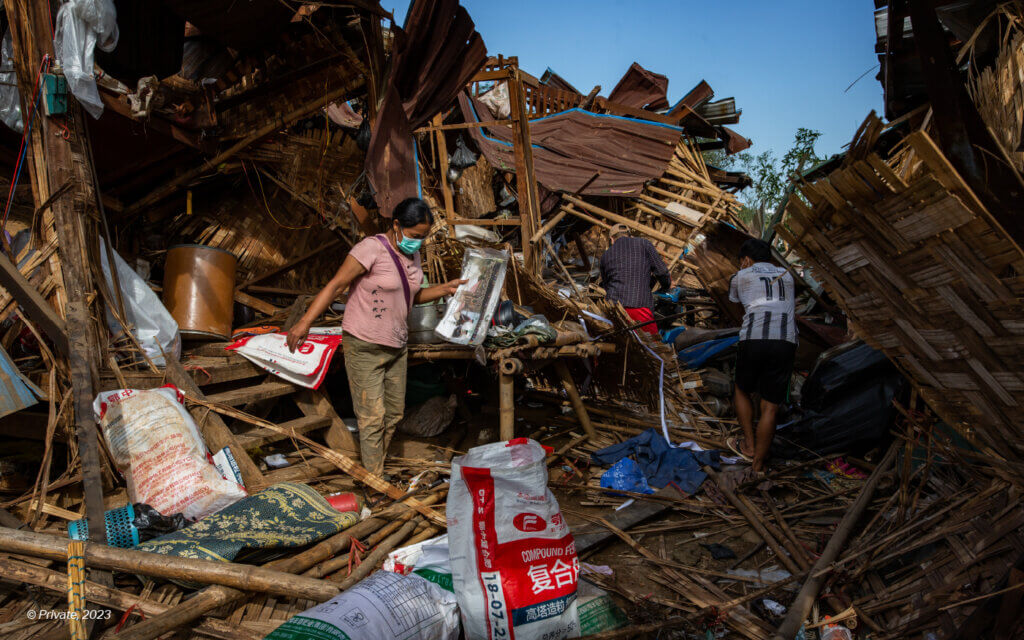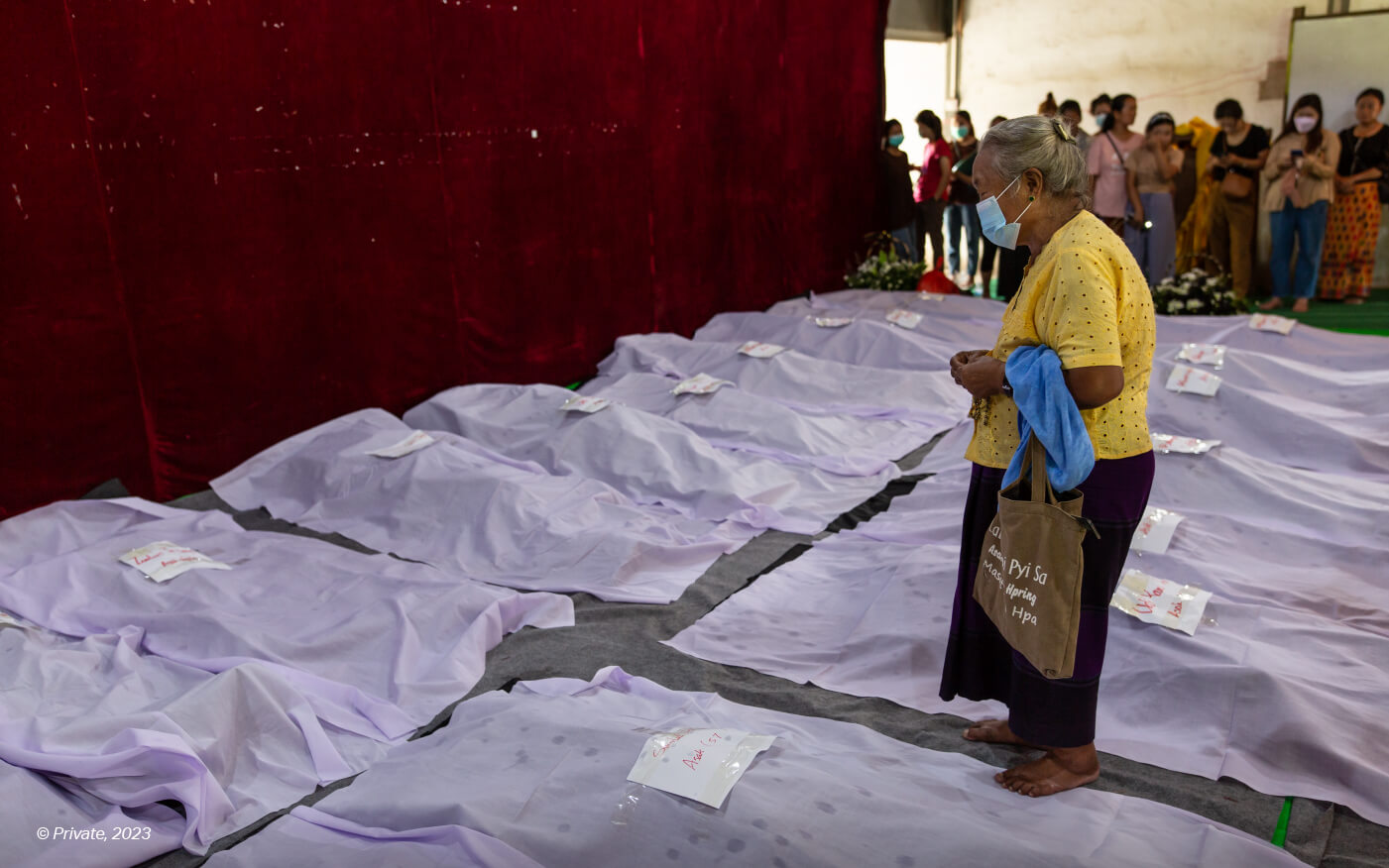Junta attack on displaced civilians kills scores, including children
(BANGKOK, October 11, 2023)—In the wake of a Myanmar junta attack on displaced persons and other residents in Laiza, Kachin State, that killed dozens of civilians including children, U.N. Member States should urgently coordinate a global arms embargo on Myanmar, and the U.N. Security Council should refer the situation in the country to the International Criminal Court, said Fortify Rights today.
“The Myanmar military continues to attack civilians, including children, women, and the elderly, with total impunity and using weapons obtained from other U.N. member states,” said John Quinley, Director at Fortify Rights. “How many more children need to die before the U.N. Security Council does its job to protect peace and security?”
At approximately 11.30 p.m. on October 9, 2023, the Myanmar military attacked Munglai Hkyet, which was reportedly home to 100 displaced families and 50 permanent residents. The attack killed at least 29 people, including women and children, and injured many others.
Munglai Hkyet is located in the northern part of Laiza, a Kachin town on the China border, a few miles from more obvious military targets. Laiza is home to the headquarters of the Kachin Independence Army (KIA), an ethnic resistance organization. Fortify Rights did not confirm the means by which the junta carried out the strike on Munglai Hkyet.

Fortify Rights received and reviewed mobile-phone videos and dozens of photographs from the aftermath of the attack showing burned dead bodies of civilians, including children and the sites of a destroyed kindergarten, church, and IDP shelters. Fortify Rights also spoke with two ethnic-Kachin residents of Laiza about the attack.
“Waichyai Naw,” not his real name, 44, said the attack happened in Quarter 9 of Laiza. He was near the location at the time of the attack and also visited the impact area after the bombing occurred. He told Fortify Rights:
I heard a loud sound after 11 p.m. last night, October 9. . . . It was the area where the IDPs were temporarily residing. I was at home watching the Gaza-Israel news, and I heard a loud explosion. It felt like a strong earthquake. Not just my house but the whole town felt this. Some of the ceilings at the church dropped down during the explosion. Some of the concrete from the walls fell in my house. It was very severe.
Waichyai Naw said that the Myanmar military is based around the Lailum Awngja area and that they often shell toward Laiza. Describing the October 9 attack, Waichyai Naw said:
It was different from how it felt and exploded before. Usually, the SaKaSa [junta] troops use 120 or 150 mm, and it wasn’t like that this time. It didn’t sound like the usual heavy machinery shelling. . . .It happened so quickly that I could hear the speeding sound pheeee and then a loud bang and an explosion. People I spoke to from nearby also said the shelling exploded in three steps. The drop area was like half an acre. I saw a lot of destruction. The surrounding area of the drop site looked like a cyclone had come in. Some of the houses’ roofs were blown off.
Another Laiza resident who visited the hospital treating wounded survivors of the junta’s deadly attack told Fortify Rights:
I went to the hospital this morning [October 10]. I spoke to hospital staff, and they said 29 people have died and 57 people are injured. . . . I saw people with bandages on their heads, faces, hands, and legs who survived the attack.
Speaking on a military junta-run television network, junta spokesman Zaw Min Tun denied the military was responsible.
Since launching a deadly coup d’état in 2021, the Myanmar junta has frequently attacked civilian-populated areas throughout the country, including ethnic border areas, threatening international peace and security. The Myanmar junta air force also invaded the air space of Thailand, Bangladesh, and India in June 2022, August 2022, and January 2023, respectively.
International humanitarian law — also known as the law of war — is applicable to the situation in Kachin State, which constitutes a non-international armed conflict. In particular, the Geneva Conventions provide the underlying basis for much of the law of war, setting forth fundamental rules that regulate the conduct of armed conflict. Specifically, Common Article 3 of the Geneva Conventions protects civilians in a non-international armed conflict stating, stating:
Persons taking no active part in the hostilities, including members of the armed forces who have laid down their arms and those placed hors de combat (out of the fight) . . . shall in all circumstances be treated humanely, without any adverse distinction founded on race, color, religion or faith, sex, birth or wealth, or any other similar criteria.
Under the law of war, parties involved in the conflict are required to distinguish between, on the one hand, civilians and “civilian objects” (such as homes and hospitals that are not being used for military purposes) and, on the other hand, combatants and “military objectives.” Both direct attacks and indiscriminate attacks that target civilians and “civilian objects” are expressly prohibited by the law of war.
Article 27 of the Fourth Geneva Convention guarantees the protection of civilians “against all acts of violence.” Article 32 prohibits “taking any measure of such a character as to cause the . . . extermination of protected persons,” which includes not only murder but also “any other measures of brutality.”
Under Article 8(2)(c)(i) of the Rome Statute, “Violence to life and person in particular murder of all kinds” when “committed against persons taking no active part in the hostilities” are considered serious violations of international humanitarian law that may amount to war crimes. Similarly, under Article 8(2)(e)(i) of the treaty, “intentionally directing attacks against the civilian population as such or against individual civilians not taking direct part in hostilities” in a non-international armed conflict constitutes war crimes.
Under these benchmark international standards, the Myanmar military’s attack on Munglai Hkyet — which killed dozens of civilians without satisfying any reasonable military objective — constitutes a severe violation of international humanitarian, criminal, and human rights law, and may amount to a war crime, said Fortify Rights.
This latest act of violence further adds to a number of atrocity crimes committed by the Myanmar military in recent years. In the first six months after the Myanmar military launched its coup d’état on February 1, 2021, Fortify Rights and the Schell Center at Yale Law School documented crimes against humanity perpetrated by the military and police in Myanmar, including murder, imprisonment, torture, persecution, and enforced disappearances. Furthermore, in January 2023, 16 survivors from Myanmar and Fortify Rights filed a criminal complaint with the Federal Public Prosecutor General of Germany, under the principle of universal jurisdiction, which provided new evidence of genocide, crimes against humanity, and war crimes committed by senior Myanmar military generals and others against women, men, and children in Myanmar for longer than a decade.
The U.N. Security Council has recognized that military coups, mass atrocity crimes, and cross-border refugee crises can threaten international peace and security sufficiently to invoke its authority under Chapter VII of the U.N. Charter.
The Security Council has the legal authority, under Chapter VII, to mandate arms embargoes to maintain or restore international peace and security. In this context, both before and after its coup, the junta’s systematic attacks against the civilian population have been characterized as mass atrocity crimes, displaced nearly two million people within the country, and forced more than a million people to live as refugees in neighboring countries.
On December 21, 2022, the U.N. Security Council adopted an historic resolution, denouncing human rights violations by the Myanmar military since the February 1, 2021 coup d’état. This was the first Security Council resolution on Myanmar since the country became independent in 1948, but, while important, it failed to mandate action from U.N. Member States.
On June 18, 2021, the U.N. General Assembly adopted a non-binding resolution that “calls upon all member states to prevent the flow of arms into Myanmar.” A majority of Myanmar’s neighbors in the Association of Southeast Asian Nations supported the resolution; only Belarus voted against it.
The Myanmar military has perpetrated atrocity crimes against Kachin people for decades. For example, in 2014, Fortify Rights documented how the Myanmar military and police committed widespread and systematic torture of Kachin people.
“The Myanmar junta is a long-time threat to international peace and security, and U.N. member states have the responsibility to prevent and remedy the atrocities,” said John Quinley. “The international community must work with the people of Myanmar and local humanitarian groups to aid those displaced by these ongoing brutal acts of violence.”
